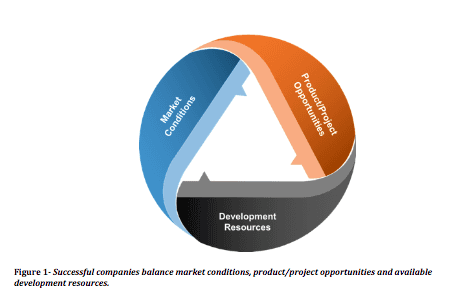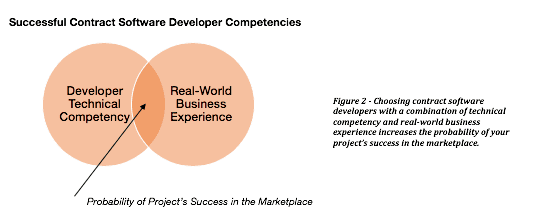8 Things to Know Before Choosing a Contract Software Developer
December 20th, 2018
Introduction: Balance = Profitability
To operate profitably in today’s economy successful businesses must balance market conditions with product/project opportunities and available development resources.
Many companies attempt to achieve this balance using contract software developers—some realizing more success than others.
This white paper identifies eight things successful companies consider when choosing a contract software development partner. Understanding them can mean the difference between profit and loss—and between your project’s success and failure.
1. Successful Contract Software Developers Have (and Hit) a Schedule
If you’re investigating a contract software developer, your project probably already has some schedule risk. If you miss your schedule, you fail. Turning over development to a contract software developer who can’t answer schedule questions is a sure-fire recipe for you missing your schedule.
So, choose a contractor who asks you lots of detailed questions about your schedule and deliverables before taking the job. Then, you ask them about the tools they use to plan development work and allocate developer resources. Ask to see those tools with live data from a current project. Look for how detailed those plans are. Since you will often be paying by the hour, the tools the developer uses should provide scheduling and resource usage to the hour.
If they have this, they will likely hit your dates.
2. Successful Contract Software Developers Commit to Your Budget Requirements
Companies large and small have been victims of “outsourcing hype”—the promise of cheap engineering at a fraction of the cost of hiring and using your own employees. While the hourly rates were low, the number of hours spiraled out of control. The result—“outsourced” projects come back (too often significantly) over budget, and late as well.
When your budget can't slip, and you can’t afford any surprises, look for a contract software developer who can bid the work in a way that meets your budget requirements. Three common ways to have them bid the project are:
- Fixed hourly rate
- Time and materials rate
- Fixed price bid
If you have clearly defined requirements, a competent contract software developer can make one or more of these methods work for you and your budget. However, if you need assistance in defining the software requirements, ensure that the contractor you choose is experienced (and can provide examples and references) to assist you in requirements definition stage of your project as well.
Also, make sure the developer provides up-to-date time sheets. These are the best indicators that 1) the developer has sufficient resources working on the project, and 2) the developer is tracking to your budget requirements.
3. Successful Contract Software Developers Have Real-World Business Understanding
Talented contract programmers are a great asset; however, talent alone doesn’t guarantee your project will succeed in the marketplace. Experience in taking projects/products to market can be as important as the amount of technical competency possessed by a contract software developer. Knowing what works and what doesn’t work in the marketplace is an invaluable asset.
Look for a contract software developer with a track record of completed projects actually delivered to and used in the marketplace. Ask to see some up-and-running examples of live work done for other companies. This kind of portfolio is the best indicator the developer can bridge the understanding of their client’s business with the client’s project deliverables.
A developer who provides you with market experience-based feedback is a greater asset than one who simply agrees with you because you’re the client.
4. Successful Contract Software Developers do Quality Work (and Provide a Warranty)
It is rumored that US Government procurement people operate by an unwritten rule that purchasers expect at best to realize two of the following three attributes in buying a product or service:
- Quality
- Timely
- Cheap
Because you already know you get what you pay for, applying this rule to contract software developers is simple: You want a quality product in a timely fashion.
Find out if the contract software developer operates the quality assurance (QA) function separate from the development function to test deliverables. Superior developers will even warrant their work and provide free bug fixes during the warranty period. A developer who is fearful of providing a warranty is a “red flag” from a quality-of work perspective.
5. Successful Contract Software Developers Provide Documented Deliverables
For companies that build their businesses on the backs of their software deliverables, few things are more frustrating than contract developers who deliver poorly documented (or undocumented) projects and source code.
Successful contract developers understand the need for accurate, readable, useable documentation. Ask for representative samples of:
- Project requirements documents
- Design documents
- Fully commented source code
- Test cases and methodologies
- Project documentation
- User training and help documents
This is vital for venture-funded companies, as these documents are essential in any exit or liquidity event.
6. Successful Contract Software Developers Keep You Informed on Your Project’s Status
Knowing where your project is at, and who you can talk to find out the details is critical to being successful when using contract software developers. It’s not a good sign when your contract developer keeps you in the dark about your project’s status. Direct access to project managers, programmers and QA staff can mean the difference between getting a question answered in five minutes or five days. If you’ve ever had to report that you “don't know what's going on with the contract programmers,” then you know what we’re talking about.
Clear communication using multiple means is a vital key to successfully working with contractors. See that the developer allows you to talk directly with the programmers, project managers and QA people. Find developers who share their code-developing tools with you so you can stay in-the-loop. Look for developers who offer multiple means of communication including:
- Phone
- Web conference
- Instant messaging
- IP telephony
- Web-based project management tools
These give you an added advantage and ensure collaboration when working with contractors and resources in multiple geographies and time zones, and will keep you in-the-know at every step along the way.
7. Successful Software Developers Protect Your Intellectual Property
A word to the wise: intellectual property (IP) ownership is one of those clauses that even the biggest companies forget to take care of. If you fail to do this, questions will almost certainly arise over what happens to the intellectual property (IP) or who has rights to it.
Another word to the wise: IP ownership conflicts are compounded when your contract software developer is incorporated in another country than your own.
Last word to the wise: Avoiding “open source” software licensure and IP entanglements is critical to protecting the value of your company’s IP in a technology sale, license or transfer to another company. You will be required to assure the buyer that your code is “clean” from an IP perspective.
From an IP ownership perspective, two of the biggest success factors for operating a contract software developer engagement are: 1) choosing a contract developer who assures you that what they develop for you is yours and yours alone; and, 2) choosing a contract developer incorporated in the same country as yours--and thus subject to the same laws as your company; and 3) choosing a contract developer with experience in delivering “clean” code free of any “open source” contamination. (You can lose your legal shirt on this one.)
These three factors will provide you with legal confidence and means of recourse that avoid the costs and difficulties associated with adjudication under US and international law.
8. Successful Software Developers Deliver Great Value for the Price
The one topic you’re guaranteed to discuss in every contract software developer engagement is price. Managing project headcount requirements by making additional labor costs a variable item rather than fixed item on the balance sheet is compelling to the people in your organization who count the money and manage profit and loss.
While this white paper has already raised multiple items to consider regarding budgets and pricing, the short answer is this: You get what you pay for. Low hourly rates are no assurance of a value-based engagement. If you do your part with clearly defined requirements (or find a contractor that is experienced in help you define your requirements to create a smart product), a successful contract software developer will deliver with high-predictability on those requirements.
Developers who deliver quality, timely software may cost a little more up front, but they’ll assure you have a solid deliverable in your hands by the deadline and will have delivered solid value for the dollars you spent.
Conclusion
Successfully using contract software developers to achieve your objectives doesn’t just happen. Companies who enjoy this success don’t do it on accident. Give your company a quick “self-diagnostic” and ask if your current contract software developers:
- Have (and Hit) a Schedule
- Commit to Your Budget Requirements
- Have Real-World Business Understanding
- Do Quality Work (and give a Warranty)
- Provide Documented Deliverables
- Keep You Informed on Your Project’s Status (Clear communication)
- Protect Your Intellectual Property
- Deliver Great Value for the Price
Find out today how DSR can help with you balance market conditions with product/project opportunities and available development resources. Contact us at contact@dsr-company.com.

